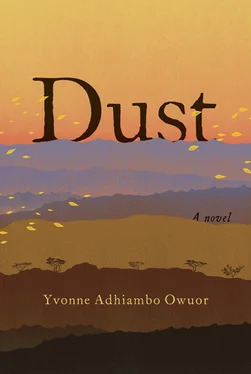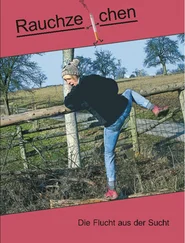Lari Massacre.
Manipulation of the insurgent’s generals.
Terrains of waiting.
Selene stole forgetfulness with music and etched scratch grooves into her two Patti Page albums. The songs became indecipherable from the outside screeching of Naivasha’s seasonal winds. She latched onto Perry Como and his “cute little cottage” in “Hot Diggity,” as she created a sound turret that was aloof from Kenya’s happenings. In the late evenings, music from the servants’ quarters swarmed over her sleeplessness: Griff’s Mambo, replays of Machito’s swinging Afro-Cuban Kenya , every sixth song Lord Flea’s “Shake Shake Sonora.” There was rumba she learned by melody, and not name, Congolese sounds she could hum to if she chose, but did not. Her resistance to the forced intimacy of shared aesthetic sentiment with alien servants.
This country.
Next day, news of a raid on the Naivasha police station.
Good , cheered Selene. About time. Hit the installations. Make it a real insurrection so I can go home . She wanted to read about the disruption of the railway system, public works, the water works, detonations in the city, an uprising by the population, the basics of an insurgency, real combat, and, finally, evacuations.
Nothing.
Selene sobbed into her sewing.
A sound. She turned, clutched her throat. The servants: Noormohamed, Agwaro, Mwihaki.
Noormohamed said, “Memsahib, no one will hurt you, we are here.”
More tears. “Thank you,” she managed.
Agwaro nodded.
She wondered, Behind those placid faces, what lurks? Would they drink human blood to emphasize their separation from our lives? That night, Selene went to sleep with one of Hugh’s hunting rifles within her reach, under the bed.
A collection of Hugh’s new words:
Pseudo-gangs. Economical. Effective. Population Sweep. Flogging the forest.
Whispered words at night: My people created this country. I’ll be damned if I’ll be forced out. This is my country .…
What “my” am I? Selene wondered.
She needed the lake, its frazzled edginess. The insurgency had imploded. Disappointment. You will still die . She answered her own whispers: I know , she said, but first I want … to belong to something real, like truth. Erase unspoken things, like Hola — a work camp where an unnamed man goes berserk and pounds eleven inmates into pulp. Men are redeployed, Hugh one of those. Why?
Silence.
Hugh was transferred to Athi River to lead some of the mopping-up operations. As weeks went by, he turned florid with fury about what he called covert shenanigans . He wrote letters she never saw, crisscrossed Nairobi without her, returned to Naivasha pale and drooping. “They’re selling out.”
Selene did not ask what had been sold, and to whom.
Hugh annoyed enough people, who then arranged to dispatch him to the Northern Frontier District, a closed district and an official destination for exiles.
“With the Turkana?” Selene asked, thinking of District Officer Kennaway, conforming to the demands of heat-filled lands, walking the district naked save for sandals and an official topi helmet.
“They’re hoping I’ll resign.” Hugh’s eyes had glittered.
He left for the north. Selene had called out to Hugh as he drove away, “Say hello to Kennaway for me, would you?” She listened for Hugh’s gust of laughter. She loved his laugh.
A PUNGENT SCENT SHAKES AJANY OGANDA FROM HER THICK wool of sleep. From the doorway of wakefulness, she stares at the Trader as if from far away. His eyes carry the shimmering image of the house, of blue flames, orange sparks. Of fire and light.
You’ll burn black-black .
A resonant voice returning.
She turns away.
“You’ll burn black-black,” Bernardo had once rasped at her.
As then, she now saw herself from the outside in.
“We’re lost in the same song, we’re the same lost song.”
Speaking to her tears: “Don’t cry. I’m the son of a witch.” He had licked each tear sliding down: “Não sou eu. É a música.” Not me, it’s the music . Yet, compelled by his life, which had taken over something inside her, a madness that she offered and he needed, she still danced naked for him, stripped down to her soul. His hands cupping her breasts: “You alone?” “Não, meu amor.” She should have fled then.
Now two of four winds pound the doum palms.
Ajany mumbles.
“There!” the Trader says, his voice as serrated as a musical saw.
She sways as if drunk as he helps her up. He offers her a brew: “Ka-ha-wa?”
Ajany peers at him through hair that covers her eyes.
Galgalu reaches forward. “Ch’uquliisa?”
Ajany listens to the Trader’s hum. An ache along her spine, in her stomach; a hammering in her head. Something niggles.
The Trader says, “Ka -ha -wa … Wash the night off your body with blue water, my soul.”
Shoveling. Grating pebbles. A memory of … what? Ajany’s eyes stare into the Trader’s. Inside here, something is bleeding .
The Trader strokes Ajany’s head.
A shout: “Ehh!”
They turn.
Nyipir. “Nyaaaara!”
A hope-filled bellow.
Ajany grasps her father’s voice. Walks a few steps toward him, sniffs a faint eucalyptus scent. What was it again? Something terrifying. She sees the green tarpaulin. Eucalyptus pungency. Hint of putrefaction. The territory of infinite pain.
Odidi .
She runs.
Past Nyipir.
Arms flailing, feet gliding above the ground, she runs.
Beguiled by her rush, the gathered gawk. By the time Nyipir kicks aside the gate to try to stop her, the darkness has already swallowed Ajany.
Isaiah shakes his head to dislodge the lost-in-dreaming sensation that suffuses him.
The Trader stares into nothing with a finger across his face. “It’s out,” he explains. “Now it roams.”
Silence.

When Ajany was fifteen and lost — a drought had run for two years, and the old nanny goat simply lay down and died. Galgalu found her and shouted, “You’ll save those tears. Crying is for when camels fall.”
Ajany-jany yuak, yuak, yuak , Odidi used to taunt.
Now she leans into cave walls, clinging to stone. Odidi Oganda , she etches, and then she touches his name. When she scrapes the cave walls with her palms, she feels.
Eeeeoiiiiahaaa!
After that, as should be expected, there is stillness. It is the time of false dawn and red, purple, and blue smudges in the sky. Small moths flit in between fireflies and shadows of conical mountains. Among the sojourners there, it is understood that ekhera , the restless dead, might show up and shout around encampments at night. The most tormented sounds are the ekhera avoided by other ghosts — those exiled and lonely dead.
That night.
Eeeeoiiiiahaaa!
A hideous lament.
It contains the kernel of all their deepest yearnings.
“Eeeeoiiiiahaaa!”
The notes find and burrow into secret wounds of the hearers. Peel away scars. Goose bumps at Wuoth Ogik; even the livestock moan. Gut ache, heart murmur. Nyipir paces back and forth, a leopard caged. Paralysis starts with a popping stab in his right eye. More losing. He cannot move.
Weary.
Of waiting.
For Akai.
Where was she?
This woman.
His no-center-of-gravity war.
Weary.
Of battle losses.
Of fighting alone.
Memories are ghosts.
Читать дальше












